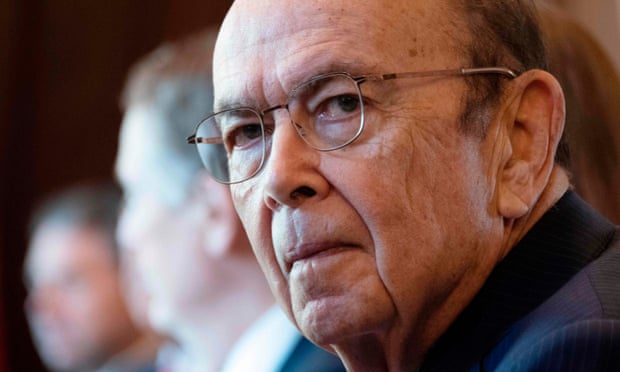Now we know...
Trump aimed to erode immigrant representation with census citizenship question, documents show
Documents reveal officials worked to keep secret their intention to use the data to exclude non-citizens from apportionment

Wed 20 Jul 2022 14.19 EDT
Last modified on Wed 20 Jul 2022 18.30 EDTDonald Trump’s administration tried to add a citizenship question to the decennial census as part of an effort to alter the way the US House’s 435 seats are divvied up among the 50 states, a new tranche of documents reveals.
The documents, released by the House oversight committee on Wednesday, offer the clearest evidence to date that the Trump administration’s public justification for adding the question was made up. For years, the administration said that it needed to add a citizenship question to the decennial survey because better citizenship data was needed to enforce the Voting Rights Act (VRA). The US supreme court ultimately blocked the Trump administration from adding the question in 2019, saying the rationale “seems to have been contrived”.
“Today’s Committee memo pulls back the curtain on this shameful conduct and shows clearly how the Trump Administration secretly tried to manipulate the census for political gain while lying to the public and Congress about their goals,” Carolyn Maloney, a New York Democrat who chairs the oversight committee, said in a statement. Maloney recently introduced legislation that seeks to block future political interference at the census bureau.
The decennial census has never asked a citizenship question and the US constitution says House seats shall be apportioned based on “the whole Number of free Persons”.
Excluding non-citizens from the apportionment count, and therefore diminishing their political representation, has long been a goal of hard-right immigration groups. It would have clear political impact: California, Texas and Florida all would have lost out on a congressional seat if unauthorized immigrants were excluded from apportionment, a 2020 projection by Pew found. Alabama, Minnesota and Ohio all would have been able to hold on to an additional seat.
Commerce secretary Wilbur Ross became interested in adding a citizenship question shortly after taking office in 2017.
That year, James Uthmeier, a commerce department attorney, set out to analyze the legality of adding a citizenship question to the census at the request of Earl Comstock, a political appointee serving in a top policy role at the agency. In an undated memo released Wednesday, he concluded that doing so would not be lawful. The document makes it clear there is little evidence those who drafted the constitution wanted to exclude non-citizens from apportionment.
“Their conscious choice not to except aliens from the directive to count the population suggests the Founders did not intend to distinguish between citizens and non-citizens for the ‘actual Enumeration’ used for apportionment,” Uthmeier wrote in the draft memo.
“Over 200 years of precedent, along with substantially convincing historical and textual arguments suggest that citizenship data likely cannot be used for purposes of apportioning representatives,” he added. “Without opining on the wisdom of such an action, a citizenship status question may legally be included on the decennial census so long as the collected information is not used for apportionment.”
But in subsequent drafts throughout 2017, Uthmeier and Comstock substantially changed that analysis.
They revised the memo to suggest there was much more ambiguity into whether a citizenship question could be added for apportionment purposes. By August 2017, they turned in a memo to Ross suggesting there was a legal basis for adding the question for apportionment purposes. “There are bases for legal arguments that the Founding Fathers intended for the apportionment count to be based on legal inhabitants,” the new memo said. “If the Secretary decides that the question is needed for apportionment purposes, then it must be included on the decennial.”
The memo was eventually hand-delivered to John Gore, a top official at the justice department (DoJ). Attached to the document was a handwritten note from Uthmeier nudging the justice department towards a rationale it could offer for adding the question.
“Sec Ross has reviewed concerns and thinks DoJ would have a legitimate use of data for VRA purposes. Please let me know if you’d like to discuss,” Uthmeier wrote. In a postscript, he suggested Gore review a recent supreme court case that could help him make the case for why existing processes for counting citizens were insufficient. Gore subsequently ghostwrote a DoJ letter to the commerce department requesting that a citizenship question be added.
The handwritten note is among the new evidence showing that commerce department officials tried to keep their work on adding a citizenship question quiet.
“Ultimately, everyone is in agreement with our approach to move slowly, carefully, and deliberately so as to not expose us to litigation risk. We can discuss further in person,” Uthmeier wrote in a September 2017 email. “At this point, Peter and I want to make sure that we are not yet discussing our analysis with outside parties that may take our discussions public.”
Kris Kobach, Kansas’ former secretary of state who led Trump’s failed voter fraud commission, advocated vigorously for the idea of adding a citizenship question to the census and excluding non-citizens from apportionment. “There are about 710,000 people in each congressional district. But, if half of the district is made up of illegal aliens, then there are only 355,000 citizens in the district. The value of each citizen’s vote in such a district is twice as high. That is unfair,” he wrote in a 2018 op-ed in Breitbart. Kobach and Ross discussed the addition of a citizenship question at the request of Steve Bannon in 2017.
The new documents significantly undercut previous testimony Ross gave to Congress about why he was adding the question. In 2018, Ross testified he added the question “solely” at the request of the Department of Justice, which was not true. The justice department declined to prosecute Ross for the false statement.
Ross also testified in 2019 that his desire to add a citizenship question to the census had nothing to do with apportionment. “This testimony is not supported by the new documents obtained by the Committee,” the House oversight committee said in a memo.
Ultimately, the failure of the commerce department to add a citizenship question blew back on Comstock, who was reportedly forced out of his role as the commerce department’s policy director in 2019. One former White House official told Politico at the time it was difficult to think of anyone who “had pissed off as many senior White House officials”.
Uthmeier is now the chief of staff to Florida’s governor, Ron DeSantis.
… we have a small favour to ask. Tens of millions have placed their trust in the Guardian’s fearless journalism since we started publishing 200 years ago, turning to us in moments of crisis, uncertainty, solidarity and hope. More than 1.5 million supporters, from 180 countries, now power us financially – keeping us open to all, and fiercely independent.
Unlike many others, the Guardian has no shareholders and no billionaire owner. Just the determination and passion to deliver high-impact global reporting, always free from commercial or political influence. Reporting like this is vital for democracy, for fairness and to demand better from the powerful.
And we provide all this for free, for everyone to read. We do this because we believe in information equality. Greater numbers of people can keep track of the events shaping our world, understand their impact on people and communities, and become inspired to take meaningful action. Millions can benefit from open access to quality, truthful news, regardless of their ability to pay for it.
Every contribution, however big or small, powers our journalism and sustains our future. Support the Guardian from as little as $1 – it only takes a minute. If you can, please consider supporting us with a regular amount each month. Thank you.




No comments:
Post a Comment